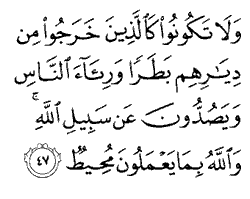Wantonness, Reason to Live, Silence of Minds
Issue 771 » January 3, 2014 - Rabi al-Awwal 2, 1435
Living The Quran
Wantonness
Al-Anfal (The Spoils of War) Chapter 8: Verse 47
 "And do not be like those who leave their homes filled with wantonness (batara), showing off before people and preventing others from the way of God. And God encompasses what they do."
"And do not be like those who leave their homes filled with wantonness (batara), showing off before people and preventing others from the way of God. And God encompasses what they do."
The word batar has several other meanings: the inability to bear blessings, bewilderness, dislike of something undeserving of dislike, and reckless extravagance.
Wantonness is a disease to which the world's affluent societies are particularly vulnerable. In societies that are extremely pleased with their standard of living, their extravagance and hubris are obvious. One sign of these conditions is the ease with which people enter into debt and live contentedly with it. People are consciously living beyond their means in order to maintain the appearance of affluence. This is a product of wantonness, willingly falling headlong into debt in order to achieve a certain material standard of living.
The treatment of wantonness is to wilfully experience hunger and to reflect seriously on death and the Hereafter. Hunger can be achieved through voluntary fasting or by simply reducing what one eats. Reflecting on death and the Hereafter is to reflect on the state of the grave, which will be either a parcel of Paradise or a pit of Hell.
Compiled From:
"Purification of the Heart" - Hamza Yusuf, pp. 27-29
Understanding The Prophet's Life
Reason to Live
We were not created only to eat, drink, and reproduce; these are natural facts of our life and natural needs. Our main purpose is to recognize and serve God. All Prophets were sent to show us how to do this.
Prophet Muhammad (peace be upon him) had been sent to open the way to the guidance of humanity and jinn, and for all time. Once this had been done, there would be no reason for him to live, for he would have nothing more to do. This implies that believers should never neglect their essential duties in this world, and should pray, as instructed by God's Messenger (peace be upon him): "O God, make me die if death is good for me; or else, make me live long as long as living is good for me!" [Bukhari]
Compiled From:
"The Messenger of God: Muhammad" - Fethullah Gulen, pp. 25, 26
Blindspot!
Silence of Minds
When Muslims speak among themselves, they are inexhaustible in criticism of their co-religionists and, more broadly, of the catastrophic state in which the Ummah finds itself. Complaints and rejections are the rule. The least that can be noticed, from Morocco to Indonesia, is a feeling of bitterness, malaise and deep disenchantment that is shared by a large majority of the people. The affective inventory is negative.
We can certainly understand this, for there is nothing delightful in that which we can observe today. Yet, what is more vexing is the fact that the affect takes precedence over a real, precise, in-depth, critical and uncompromising analysis of the causes of these fractures. The Muslim World, for the one who can see, is still lacking intellectual exactness. Very limited in number are those voices that go to the limits of honest analysis, that refuse to say something and then keep quiet when they see its contrary being applied, that denounce events, governmental policies or silent conspiracies.
We are in a state of emergency. It would be too difficult to emerge from the actual upheaval without making a precise analysis of the causes and responsibilities: from the illiteracy of people to the betrayals of the powers in place whose hypocritical policies one must denounce at the cost of one's life perhaps – but this is the passage obligated by reform. Keeping silent is tantamount to being an accomplice, it is "betraying God, His Prophet and all the Believers," according to the exacting expression of the Prophet (peace be upon him). On the geo-strategic level and at the level of economic policies, some Muslim countries participate and collaborate in an immoral management of the world and are implicated in some of the most dubious dealings and trades. All this must be analysed, rigorously described, stated and then denounced. It should, of course, be denounced in a constructive manner, but also loudly, clearly and intelligibly.
Compiled From:
"Islam, the West and the Challenges of Modernity" - Tariq Ramadan, pp. 288, 289